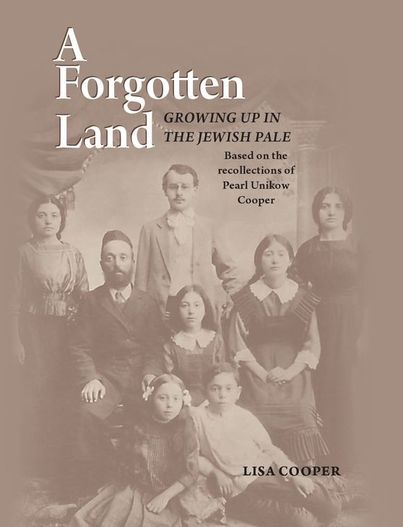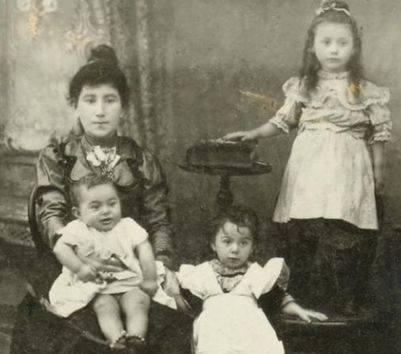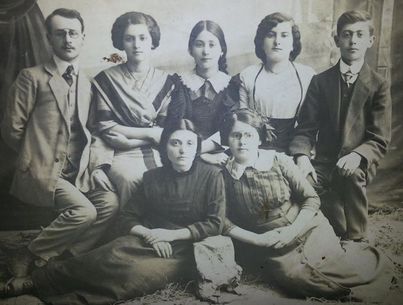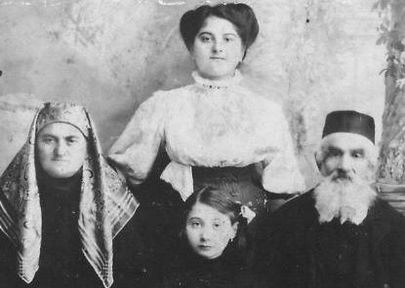|
Click on a picture to open the photo gallery
|
This book is my grandmother's story. She was an inveterate storyteller and my father grew up immersed in these tales of her early life. In the late 1970s, when my grandmother was an old lady, my father decided to record her telling some of her stories. Until 2004 I had never listened to these cassettes. They were recorded in Yiddish, a language I don't understand, and as a youngster I was never sufficiently interested to ask my father to translate them. I had no idea what a rich and fascinating history they would reveal. Dad himself had not revisited the tapes for years.
When my father reached his 70s, I began to fear that the stories would be lost, for who else would be able to translate Grandma's words, and know enough of her background to make sense of them? Together Dad and I listened to the cassettes one by one and pieced together a story. Hour after hour, Dad translated while I typed. The result was a couple of dozen A4 pages of fragmented, disordered recollections, often repetitive and riddled with contradictions. I have backed these up with endless questioning, historical research and background reading, verified facts with other family members wherever possible and added large helpings of imagination, conjecture, speculation and guesswork to fill in gaps and bulk out sketchy outlines. In parts, I have borrowed ideas and imagery from other writings on this period. As I wrote this account of my grandmother's life, it took some effort to comprehend that this was the same person that I had known as Grandma. By the time I knew her, she was a tiny, fragile, stooped old lady with walnut-wrinkled skin. She lived with her sister Rachel in a small but comfortable apartment in the West Hollywood district of Los Angeles, on the second floor of a three-sided block built around a swimming pool. Los Angeles was a long, long way from Norwich, England, where I grew up, and we visited only every few years. I don't remember Grandma telling me stories. Mostly my memories of her involve food - intricate dishes that we never ate at home: blintzes and knishes, cinnamon rolls and poppy seed cookies. Back in Norwich we remembered her by the regular parcels of chunky hand-knitted sweaters and strangely shaped woollen slippers that the postman delivered year after year, and by Hanukkah cards written in mysterious Yiddish squiggles that Dad had to translate. Sometimes the cards took months to arrive because Grandma had written the address down incorrectly - she never learnt to write English properly. Discovering Grandma's stories of her early life in Russia, I often found it hard to believe that we could be related. How could she and I, just two generations apart, lead such different lives? But looking at photos of Grandma in her youth, the close family link is abundantly evident. Grandma bore witness to many terrible events that took place in Russia in the first part of last century: war, pogroms, famine, disease and emigration not only tore families apart, but also seared the heart out of Jewish communities like the one in which she grew up. And after she and most of her family were safely in Canada, the Nazis would do the rest. To buy a copy of A Forgotten Land, click the Contact link. |
I studied Russian at Edinburgh University, attracted by a passion for languages and a fascination with the country's people and history. As a student, I spent a year in the southern Russian city of Voronezh, a period that coincided with another of the country's momentous turning points - the dismantling of the Soviet Union. Armed with nothing more than an old address dating from the 1960s and a family tree, I managed to make contact with cousins in Kiev, who introduced me to a web of relatives I knew nothing about. The experience helped breed an interest in both family history and Ukrainian history.
A Forgotten Land was originally conceived as a dissertation for a Masters degree in Russian History. Sidetracked by the rich and fascinating story that my grandmother's tapes revealed, I abandoned the university course and set about turning the work into a novel based on my own family's lives and experiences. The resulting book is an amalgam:
"Not fiction, not memoir, not history, not biography but an imaginative interweaving of all of these, A Forgotten Land, like Primo Levi's The Truce and Edmund de Waal's The Hare with Amber Eyes, is a true story told in the voice of a narrator who is part of it. And like these classics, this one is skilfully shaped by an author who knows how to capture and hold her readers. Open to the first paragraph and you'll find it hard to stop reading till you get to the last." Anne Stevenson, author and poet
A Forgotten Land was originally conceived as a dissertation for a Masters degree in Russian History. Sidetracked by the rich and fascinating story that my grandmother's tapes revealed, I abandoned the university course and set about turning the work into a novel based on my own family's lives and experiences. The resulting book is an amalgam:
"Not fiction, not memoir, not history, not biography but an imaginative interweaving of all of these, A Forgotten Land, like Primo Levi's The Truce and Edmund de Waal's The Hare with Amber Eyes, is a true story told in the voice of a narrator who is part of it. And like these classics, this one is skilfully shaped by an author who knows how to capture and hold her readers. Open to the first paragraph and you'll find it hard to stop reading till you get to the last." Anne Stevenson, author and poet




